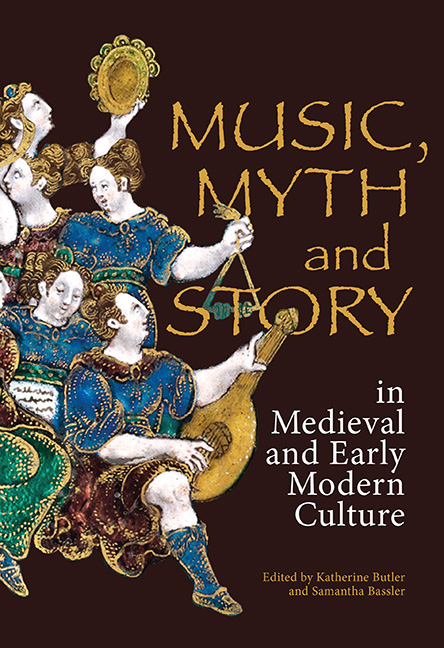Book contents
- Frontmatter
- Contents
- List of Illustrations
- List of Contributors
- Editors’ Note
- Introduction
- I MYTH IN MEDIEVAL MUSIC THEORY AND PHILOSOPHY
- II ICONOLOGIES OF MUSIC AND MYTH
- III MYTHS IN RENAISSANCE PHILOSOPHIES OF MUSIC
- IV MYTH AND MUSICAL PRACTICE
- V NARRATIVES OF PERFORMANCE
- 10 Ophelia's Mad Songs and Performing Story in Early Modern England
- 11 Dangerous Beauty: Stories of Singing Women in Early Modern Italy
- VI MYTH AND MUSIC AS FORMS OF KNOWLEDGE
- VII RE-IMAGINING MYTHS AND STORIES FOR THE STAGE
- Bibliography
- Index
- Studies in Medieval and Renaissance Music
10 - Ophelia's Mad Songs and Performing Story in Early Modern England
from V - NARRATIVES OF PERFORMANCE
Published online by Cambridge University Press: 24 October 2019
- Frontmatter
- Contents
- List of Illustrations
- List of Contributors
- Editors’ Note
- Introduction
- I MYTH IN MEDIEVAL MUSIC THEORY AND PHILOSOPHY
- II ICONOLOGIES OF MUSIC AND MYTH
- III MYTHS IN RENAISSANCE PHILOSOPHIES OF MUSIC
- IV MYTH AND MUSICAL PRACTICE
- V NARRATIVES OF PERFORMANCE
- 10 Ophelia's Mad Songs and Performing Story in Early Modern England
- 11 Dangerous Beauty: Stories of Singing Women in Early Modern Italy
- VI MYTH AND MUSIC AS FORMS OF KNOWLEDGE
- VII RE-IMAGINING MYTHS AND STORIES FOR THE STAGE
- Bibliography
- Index
- Studies in Medieval and Renaissance Music
Summary
THE twinned ideas of music and disability – particularly madness and melancholy – shaped pre-Enlightenment views of gender, disability and conceptions of normativity, through both performances on the stage, and also performances during literary characterisation and narrative. The dramatic works of Shakespeare and other playwrights performed stories of disability and music, illuminating early modern cultural tropes of gender and disability through music. This chapter begins with consideration of Ophelia as an archetype of madness and femininity, and then expands to other examples of performing stories of femininity, madness and disability in early modern English culture. The first section describes the connections of madness and melancholy to disability, explaining how theoretical perspectives from disability studies can enhance our understanding of music, myth and story in early modern English culture. The second section illuminates the relationship between music, story, disability and gender in the character of Ophelia, while the third section examines female madness and melancholia in Desdemona, followed by male madness and melancholia in Richard II and Duke Orsino, and ends with a consideration of the ambiguously gendered Viola. The chapter closes by deconstructing the seventeenth-century understanding of melancholy and relating it to concepts of disability in early modern English culture.
MADNESS, MELANCHOLY AND DISABILITY IN EARLY MODERN ENGLISH CULTURE
This chapter relies upon the framework of disability studies. This is a relatively new methodology of history, literature, cultural studies and musicology, which constructs a historical narrative that recognises the relationship between music, impairment, gender and (dis)ability in late Renaissance culture. The field of disability studies is significant for providing a language and a framework for understanding non-normative ways of being, and for relating closely to Neoplatonist theories of music and the body. Music and being also have similarities to the soul. According to the philosopher Plotinus, the founder of Neoplatonism, both ‘imperceptible’ and ‘perceptible’ harmonies affect the soul's ability to comprehend beauty:
The harmonies in sounds, too, the imperceptible ones which make the perceptible ones, make the soul conscious of beauty in the same way, showing the same thing in another medium. It is proper to sensible harmonies to be measured by numbers, not according to any and every sort of proportion but one which serves for the production of form so that it may dominate.
- Type
- Chapter
- Information
- Music, Myth and Story in Medieval and Early Modern Culture , pp. 169 - 186Publisher: Boydell & BrewerPrint publication year: 2019



